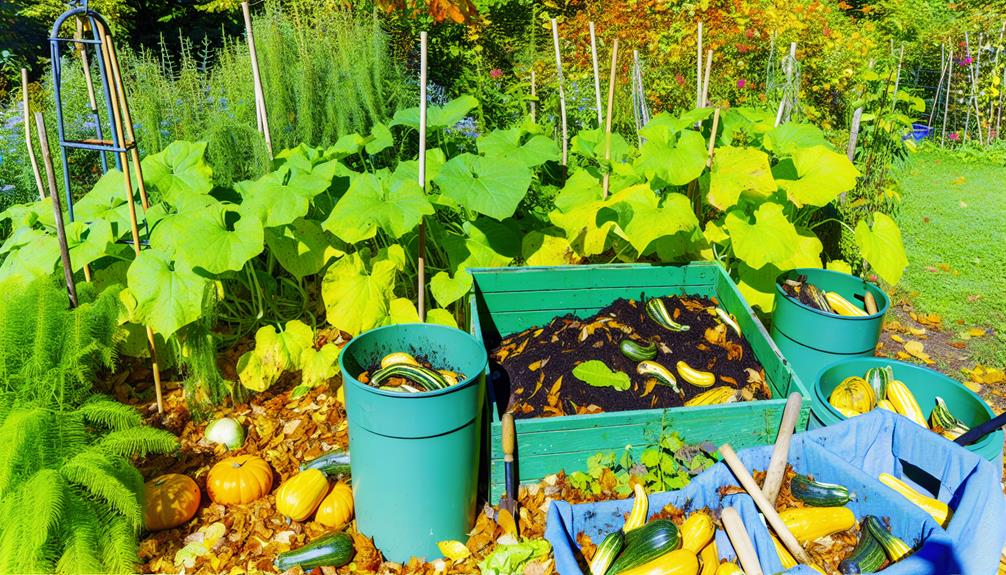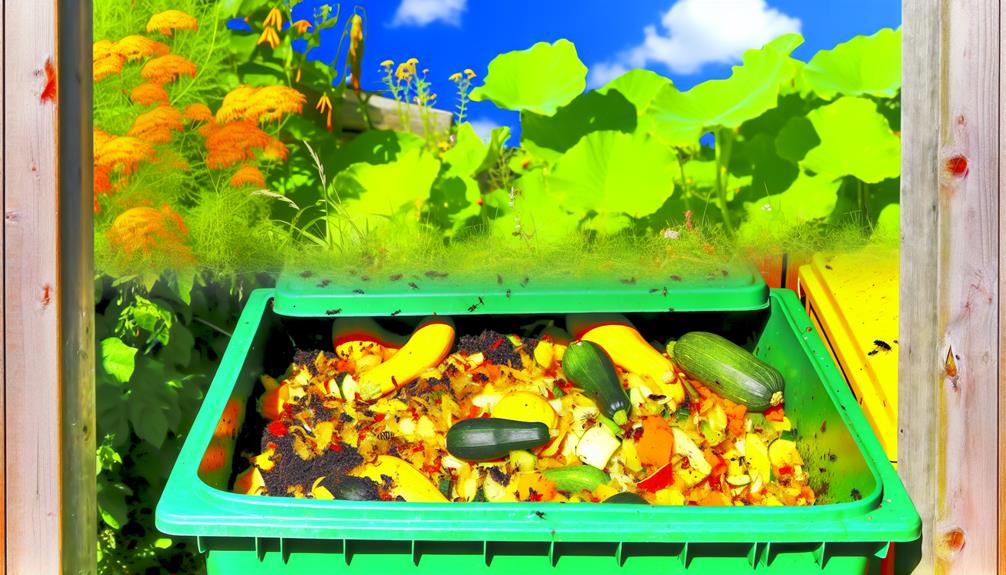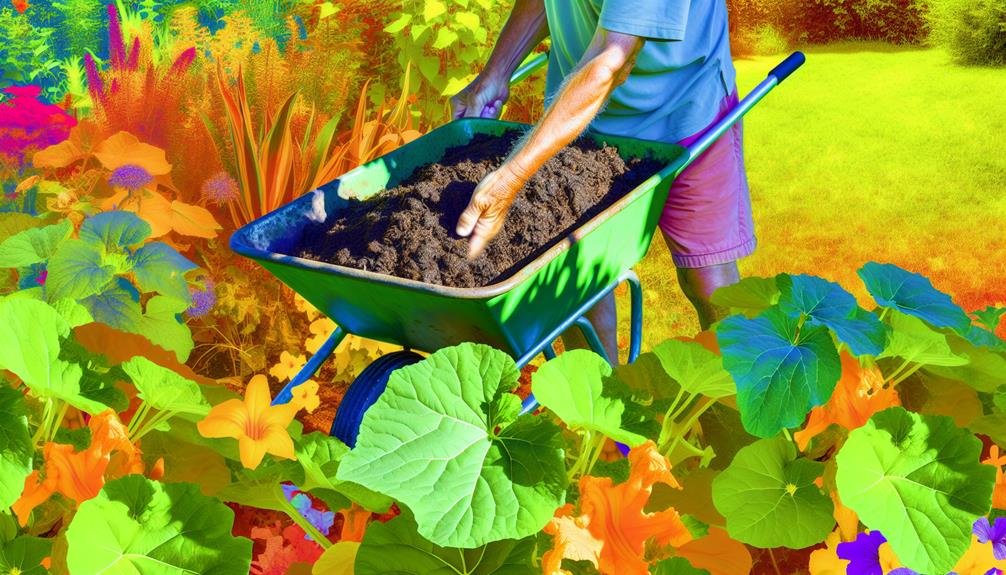

Yes, you can compost summer squash. It enriches the soil with essential nutrients like nitrogen, potassium, and phosphorus. Start by cutting the squash into small pieces for faster decomposition. Rinse any dirt or pesticides off, and remove the seeds to prevent sprouting.
For best composting results, balance your pile by mixing green materials like squash with brown materials such as dried leaves. Manage moisture and aeration to avoid foul odors. Regular turning guarantees even breakdown and healthy compost. Using compost will boost plant health and reduce the need for chemical fertilizers. To get more tips, let’s proceed further.
Composting summer squash offers numerous benefits, including enriching your soil with essential nutrients and reducing kitchen waste. By adding summer squash to your compost, you’re helping create a rich, organic material that enhances soil quality.
The squash breaks down into valuable compost that provides plants with essential nutrients like nitrogen, potassium, and phosphorus, leading to healthier and more robust growth in your garden.
In addition to nutrient enrichment, composting summer squash greatly aids in waste reduction. Instead of throwing away those leftover squash peels and scraps, you’re turning potential waste into something beneficial for your garden. This practice not only reduces the amount of organic waste heading to landfills but also supports a more sustainable lifestyle.
You’ll find that your garden thrives when you incorporate composted summer squash into the soil. The organic matter improves soil structure, enhances moisture retention, and encourages beneficial microbial activity. All these factors contribute to a vibrant garden community where plants flourish.
To prepare summer squash for composting, start by cutting it into smaller pieces to speed up the decomposition process. First, give your squash a good cleaning. Rinse it under cool water to remove any dirt or pesticides that might be on the skin. This step guarantees that your compost remains free of unwanted chemicals.
Next, move on to chopping squash. Use a sharp knife to cut the squash into small chunks, around one to two inches in size. Smaller pieces break down faster, helping your compost pile become rich and fertile more quickly. If you have a large amount of squash, consider using a food processor to chop it up more efficiently.
Don’t forget to remove any seeds before chopping. While seeds will eventually compost, they take longer to break down and might sprout in your compost pile, causing unwanted growth.
Also Read: Can You Compost Cabbage?
You might encounter several common composting issues, such as foul odors, pests, and slow decomposition. These problems can be frustrating, but with a little attention to detail, you can manage them effectively.

Here are some common issues and tips to address them:
Bad smells often indicate too much moisture or not enough aeration. Turn your compost pile regularly to introduce air and balance moisture levels.
Rodents and insects can be a nuisance. For effective pest control, bury food scraps deep in the pile and avoid adding meat or dairy products. Use a compost bin with a lid if necessary.
If your compost isn’t breaking down quickly, it might lack nitrogen-rich materials. Add green waste like grass clippings or vegetable scraps to speed up the process.
Too much water can drown your compost. Practice moisture management by adding dry materials like straw or leaves to absorb excess moisture. Make sure your compost site has good drainage.
Also Read: Can You Compost Broccoli?
After addressing common composting issues, it’s important to focus on balancing your compost pile for optimal decomposition. Achieving the right carbon ratio is essential. Ideally, you want a mix of green materials (like summer squash) and brown materials (such as dried leaves or straw).
Aiming for a carbon-to-nitrogen ratio of about 30:1 will help your pile break down efficiently. Too much green material can lead to a smelly, anaerobic pile, while excess brown material slows decomposition.
Equally important is maintaining the moisture balance. Your compost should be as damp as a wrung-out sponge. If it’s too dry, decomposition halts; too wet, and it turns slimy. Regularly check the moisture by squeezing a handful of compost. If water drips out, it’s too wet; if it crumbles, it’s too dry. Adjust by adding more brown materials to dry it or watering it lightly to add moisture.
Turning your pile regularly also ensures even decomposition and prevents any one area from becoming too wet or dry.
Also Read: Can You Compost Basil?
Put your finished compost to work by enriching garden soil, boosting plant health, and reducing the need for chemical fertilizers. You’ve done the hard part by creating rich compost from your summer squash scraps; now it’s time to reap the benefits.

Here’s how you can use your compost effectively:
Yes, you can compost summer squash with the seeds still inside. However, be aware that seed germination might occur, but the nutrient content will enhance your compost, enriching the soil for your community garden.
Yes, summer squash can attract pests to your compost pile. To prevent this, employ pest deterrents like covering the pile with leaves. Also, guarantee proper compost aeration to discourage pests and keep your compost community thriving.
Summer squash takes about 2-3 months to decompose in compost. Maintain moisture retention and temperature control by regularly turning the pile and adding other organic materials. You’ll contribute to a thriving, efficient composting community.
Yes, you should chop summer squash before adding it to compost. Chopping size matters because smaller pieces decompose faster, ensuring better nutrient distribution. It helps your compost community thrive and speeds up the composting process.
Yes, you can compost summer squash even if it’s moldy or rotten. The moldy texture aids in the nutrient breakdown, enriching your compost. Just chop it up, and you’ll contribute to a healthier compost community.
To sum up, composting summer squash is beneficial and straightforward. Make sure you chop the squash into smaller pieces to aid decomposition.
Monitor your compost for balance, keeping a mix of green and brown materials. Address common issues like odor or pests by adjusting moisture and aeration.
Once the compost is dark and crumbly, it’s ready to enrich your garden soil. Follow these steps, and you’ll efficiently turn kitchen waste into valuable compost.
